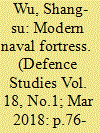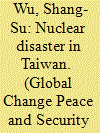| Srl | Item |
| 1 |
ID:
159094


|
|
|
|
|
| Summary/Abstract |
With its water borders under threat, Vietnam has pursued a sea-denial strategy to protect its interests
and has worked to build up the relevant military capabilities to strengthen its hand diplomatically
and avoid being the most likely victim of foreign aggression.
|
|
|
|
|
|
|
|
|
|
|
|
|
|
|
|
| 2 |
ID:
192608


|
|
|
|
|
| Summary/Abstract |
Indian military strategy has tended to neglect the link between the conventional and nuclear domains in a nuclear weapons environment. We argue that this anomaly is evident in two broad areas: the conception of “war,” and the complexity produced by new technologies that span the two domains. First, we show with empirical evidence that “limited war” in a nuclear environment is misnomer: the reality is more appropriately called “marginal conflict” owing to its extremely restricted nature. It follows that strategic planning and posture must be tailored accordingly. We then highlight the risk of escalation produced by conventional technologies that carry potential cross-domain nuclear effects, noteably with respect to cyber, artificial intelligence, missile defence and space. We note that the complex strategic effects produced also complicate military-strategic interactions traversing geographic domains, noteably South, Southeast Asia, and Northeast Asia. The paper concludes with some reflections on the reasons for these lacunae in Indian strategic thinking and what might be done about them.
|
|
|
|
|
|
|
|
|
|
|
|
|
|
|
|
| 3 |
ID:
178660


|
|
|
|
|
| Summary/Abstract |
The relationship between Southeast Asia’s military modernisation and the Indo-Pacific arena seems to be self-evident in the geostrategic sense, but it is necessary to address their linkage through several questions: what is the core theme in the Indo-Pacific arena? What is the linkage of Southeast Asia to the core theme? What is the role(s) of military modernisation in Southeast Asia to the linkage? How would the situation in the Indo-Pacific area affect Southeast Asia’s military modernisation?
|
|
|
|
|
|
|
|
|
|
|
|
|
|
|
|
| 4 |
ID:
157990


|
|
|
|
|
| Summary/Abstract |
As fixed facilities, naval fortresses seem unlikely to be important in a sea denial strategy which is usually about mobility, but new defence technologies and the changing geostrategic environment may revive the concept of the fortress. Extended ranges of anti-ship means allow onshore firepower to engage enemies over distance, even beyond the economic exclusive zones where most maritime territorial disputes occur. In the face of size limits on missile warheads that constrain their destruction of hardened targets, various active and passive defence technologies against missiles can enhance the survivability of onshore fortresses. Furthermore, onshore locations give fortresses the advantage of being unsinkable and able to accommodate greater energy and firepower capacity in contrast to vessels, as well as other mobile platforms. The onshore nature of fortresses also gives a different political meaning to being attacked, for the clear violation of sovereignty, as opposed to vessels and aircraft in a disputed space. However, the fact those fortresses are not invincible means cooperation with other existing capabilities still necessary. The case of Vietnam demonstrates how fortresses could strengthen the inferior defence capability of a coastal state vis-à-vis. a stronger sea power.
|
|
|
|
|
|
|
|
|
|
|
|
|
|
|
|
| 5 |
ID:
146642


|
|
|
|
|
| Summary/Abstract |
Despite the low probability of such an event, a serious nuclear power plant incident in northern Taiwan would create a multidimensional security challenge, in terms of both traditional and non-traditional security when factors such as high population density and geopolitical significance of the island are considered. Dealing with nuclear contamination, including evacuation, medical treatment and resettlement, would severely affect human, environmental and other categories of non-traditional security. Taiwan's insufficient level of preparation would make external disaster relief crucial. Since military units are likely to be deployed by assisting countries to respond to a nuclear event, consequent Sino-US interactions in humanitarian aid and disaster relief (HADR) could be either cooperative or competitive.
|
|
|
|
|
|
|
|
|
|
|
|
|
|
|
|
| 6 |
ID:
160457


|
|
|
|
|
| Summary/Abstract |
The Tsai Ing-wen administration of Taiwan has taken a different approach in various defense policies compared to its predecessor. Several military build-up projects are aimed at strengthening Taiwan’s defense in the context of China’s rising military power, but they are unlikely to significantly ameliorate the island’s inferior military status, due to several vulnerabilities.
|
|
|
|
|
|
|
|
|
|
|
|
|
|
|
|
| 7 |
ID:
165147


|
|
|
|
|
| Summary/Abstract |
Military obsolescence affects the capability of all militaries as it relates to serviceability and performance when countering potential opponents, and more specifically in the case of developing countries lacking strong indigenous defence industries. The gradual nature of this military concern has not been studied systematically, in contrast to military modernisation. This paper presents a synthetic framework composed of several indicators to examine military obsolescence. Vietnam has been selected for the application of the framework for its large number of Cold War legacies and the strategic pressure from China. Hanoi's ageing assets would undermine its position vis-à-vis Beijing, and its defence investment policies face the dilemma of choosing to spend more on naval and aerial power, or ameliorating its army which is technologically lacking compared to its Chinese counterpart.
|
|
|
|
|
|
|
|
|
|
|
|
|
|
|
|